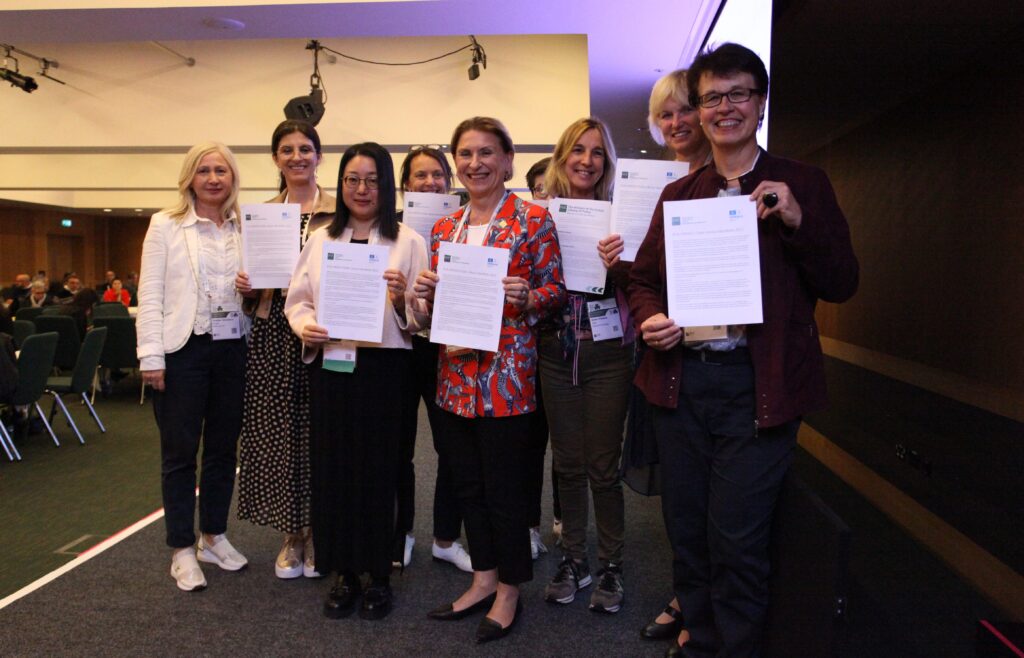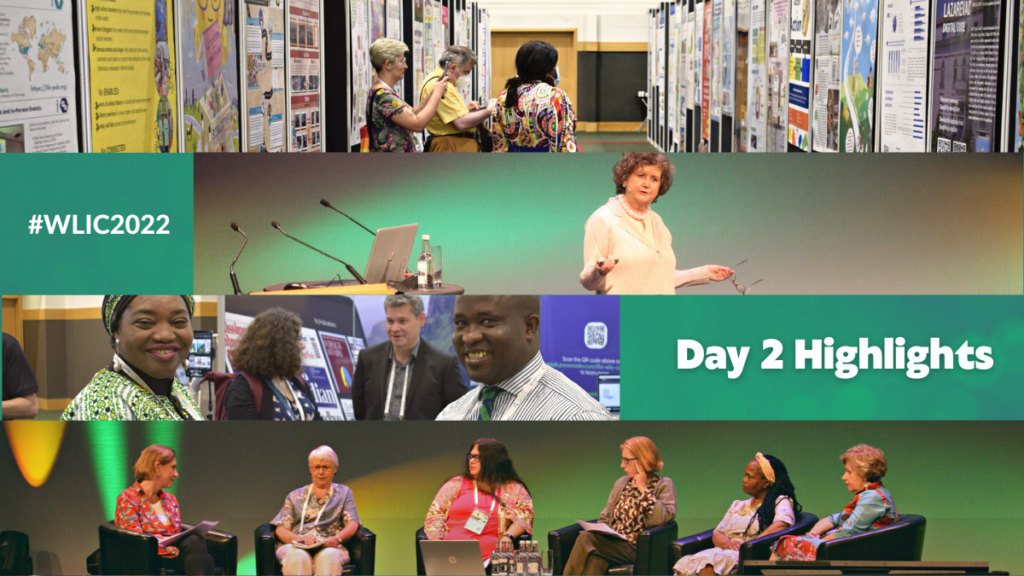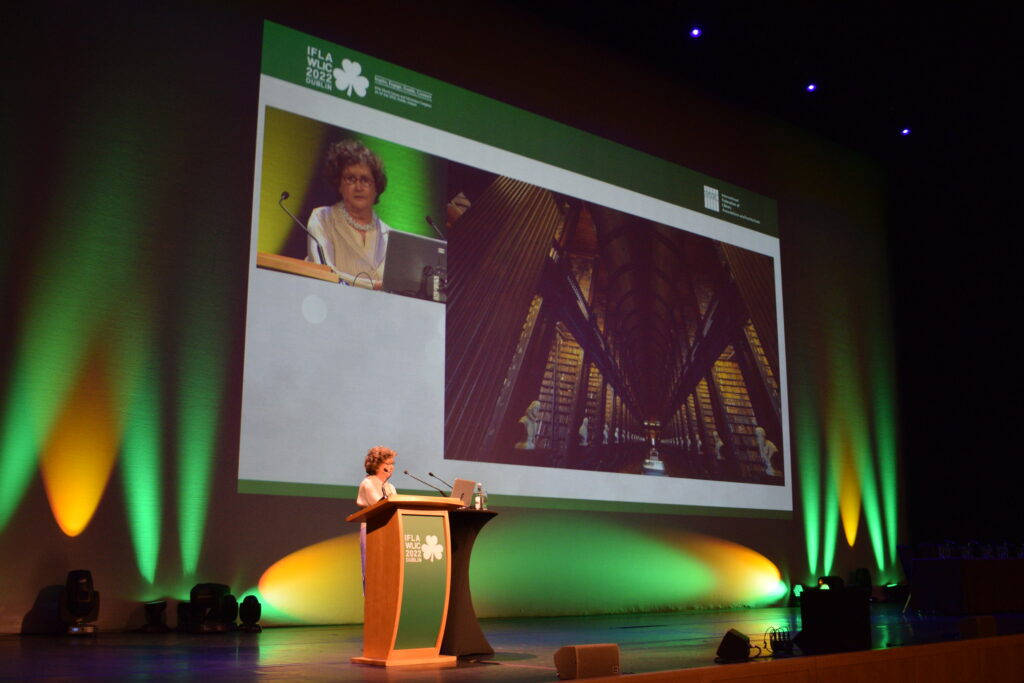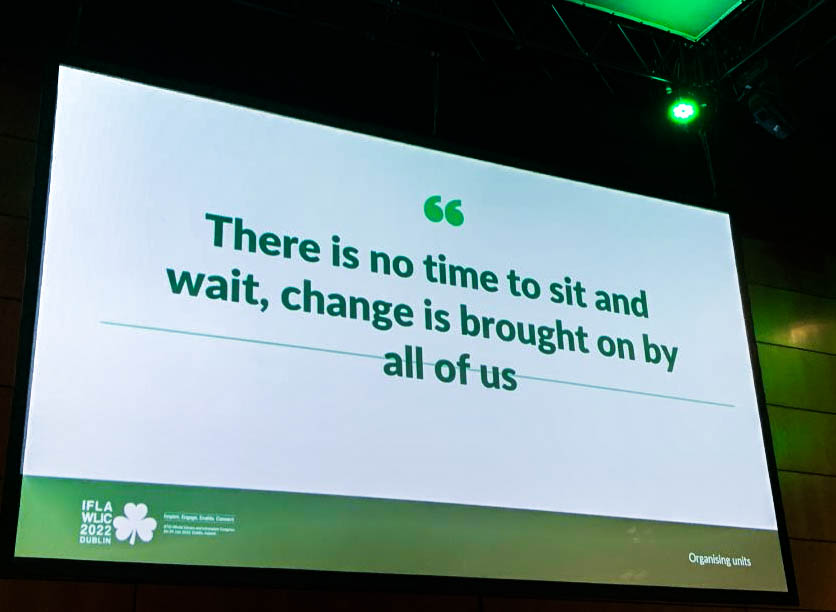IFLA WLIC 2022: Day Two Highlights
20 April 2024
Cultural Evening
Delegates danced the night away at the iconic dlr LexIcon, the Central Library and Cultural Centre in the heart of Dún Laoghaire, 10 km south of Dublin. This evening was a chance for the delegates to meet people from around the world in a relaxed environment, make new friends and share good times through the events’ performances and celebrations.
Volunteers, HQ staff, delegates from around the world and board members mingled as the versatility of the library space was demonstrated with a disco and ice-cream parlor on the upper floors.

Librarians: shhhhh
Also librarians:#WILCWOW#WILC2022 pic.twitter.com/PfZjsnSKZu— Niamh O' Brien (@niamhburo) July 27, 2022
Watch for photos on our Flickr
Enable Keynote: Helen Shenton
The intertwined digital and cultural heritage; a view from the Library of Trinity College Dublin
Helen Shenton, Trinity College Dublin’s Librarian and College Archivist addressed the congress in her keynote session to discuss the university’s Old Library Redevelopment Project and virtual library.
Describing the library as the ‘front room of Ireland’ and discussing the soft power of cultural diplomacy, she gave attendants an exciting insight into the plans to ensure the future of one of Ireland’s most important historical and cultural landmarks. She described how the two projects where intimately intertwined and emphasised how this endeavour has highlighted the importance of the experiential and sensory affect of libraries in the post-pandemic world.
Empowering Library Leaders and Diversity Worldwide
IFLA’s Management of Library Associations Section and New Professionals SIG shone a spotlight on how various Library Associations around the world are supporting leadership development in the library and information field. There were several engaging and enlightening panel discussions around the following topics:
- How do different countries or communities define ‘leadership’?
- How can we better support new and emerging professionals to take up leadership roles?
- How can we ensure that the leadership of our field is as open, inclusive, and diverse as possible? An urge to start doing things differently was shared by attendees.
A common theme among the answers discussed was how we need do things differently. Session Chair, Loida Garcia-Febo stated ‘we need business unusual’.
Poster sessions
I am extremely honored and proud to present about the International ILL Toolkit at #ifla #WLIC2022 on behalf of my research sharing colleagues Brian Miller, Lapis Cohen, and Dennis Massie! pic.twitter.com/uuhW5zwQdm
— Skee-Ball Librarian (@oodja) July 27, 2022
Over 150 posters are on display as a part of our Poster Session in the Exhibition area. The creative and enthusiastic presenters were on hand to explain their work in two-hour sessions on Wednesday 27 July, to be repeated on Thursday 28 July.
The “Best IFLA Poster 2022,” awarded during the Closing Ceremony on Thursday 28 July, will be selected from the posters presented in Dublin by a jury on behalf of the IFLA Professional Council.
Wonderful to see Irish library colleagues from @hselibrary and @corkcitylibrary displaying their lovely posters to 2,000 international colleagues @IFLA @iflawlic @TheCCD #WLIC2022 pic.twitter.com/Uhs2Y3WGSj
— Cathal McCauley (@cathalmccauley) July 27, 2022
President’s session
Engaging, Enabling and Connecting for the Future – in Dialogue with IFLA’s new President-elect
At the President’s Session, IFLA President Barbara Lison was joined by President-elect Vicki McDonald as well as chairs and representatives from groups within and outside of IFLA to reflect upon the 5 key trends for libraries identified at the 2021 President-elect’s session. These themes included combining the analogue and the virtual, tackling inequality and discrimination, promoting sustainability and life-long learning as well as advocating for digital access and equality of participation. First, Vicki shared her experience with these issues through her own work as State Librarian of Queensland. Next, Barbara was joined by Jan Richards, Vice-Chair of IFLA Professional Council, Nthabiseng Kotsokoane, Chair of IFLA Regional Council, Grainne Shaffrey who is a Member of the Board of ICOMOS Ireland, Samantha Holman, Director of IFRRO and Executive Director of the Irish Copyright Licensing Agency and Valerie Coghlan who is President of Bookbird, Inc, and involved in the Irish contingent of IBBY.
The panel discussed the effect of Covid-19 on inequality and sustainability in their relevant sectors as well as what they have learnt and can apply to better tackle such issues. Major discussion points included the importance of advocacy, the localisation of publishing and the environmental implications of digitisation and data storage en masse. Afterwards, participants expressed their appreciation for the inclusion of speakers from outside of the field of librarianship and talked about the need for conversations with professionals from other sectors.
Knowledge Café
Sponsored by the IFLA CPDWL and IFLA KM Sections, this year’s Knowledge Café saw some key themes emerge during its ten round table discussions, including ways that libraries can demonstrate their value, adapt to the post-pandemic world and increase access to technology in cases where it is unevenly distributed.
Attendees also took the opportunity to share personal experiences about working from home and the challenges this creates in terms of creating a healthy balance and structure between personal and professional life. The changing significance of the library as a physical space was also a hot topic.
Really enjoyed the #knowledgecafe at @iflawlic #wlic2022 So many topics to choose from! I chose #infodemic and keeping communications open. Really interesting listening to the different opinions on the meaning of infodemic – #informationoverload #misinformation #disinformation pic.twitter.com/peib7ydd8E
— Dr Caroline Papi De Brún (@DeBrun) July 27, 2022
Inspire: How the SDGs can change your life
The UN’s 2030 Agenda, and its Sustainable Development Goals (SDGs), will reach their half-way point next year, with a huge amount of work still needed to reach them. So far, their uptake among governments and libraries has been very promising.
But what makes them so special as an agenda for action? What can working with the SDGs do for libraries – and anyone in fact – that other roadmaps don’t provide?
Watch this session recording to hear insights from Ambassador David Donoghue, Former Permanent Representative of Ireland to the United Nations, Ireland and to hear from librarians for whom working with the SDGs has had a transformative impact.
The Use of Transformative Agreements: Do They Increase Access to Research
Coordinated by the IFLA Serials and Other Continuing Resources Section, this session asked delegates what can the librarian community do to encourage greater price transparency and global equity in scholarly access? Colleen Campbell of the Max Planck Digital Library described the high stakes facing libraries, emphasising how “transformative agreements are now an imperative for institutions that hope to meet their open access goals.” Rapid successes in implementing transformative agreements have been seen in Sweden, Slovenia, Colombia, the Netherlands, and elsewhere. Multiple publishing models, including offsetting agreement, capped read and publish, and optional read and publish, provided opportunities for greater access. The panelists concluded that transformative agreements are not a perfect solution, but by building on existing models, sharing risk with longstanding relationships, and establishing clear communication, libraries can move open access forward.
IFLA/UNESCO Public Library Manifesto 2022

The IFLA/UNESCO Public Library Manifesto proclaims UNESCO’s belief in the public library as a living force for education, culture and information, and as an essential agent for the fostering of peace and welfare through the minds of all people. IFLA and UNESCO are therefore excited to announce the start of a new chapter in library advocacy with the launch of an updated IFLA-UNESCO Public Library Manifesto.
Just released and now endorsed by both UNESCO and the IFLA Governing Board, the IFLA/UNESCO Public Library Manifesto 2022 has been updated to reflect 21st century public libraries and their contribution to their communities. This session introduced this new version and highlighted its potential for advocacy at the local and national level. Audience members had the chance to take part in interactive discussions on ways library professionals can put the Manifesto into action for library advocacy.
Read more


